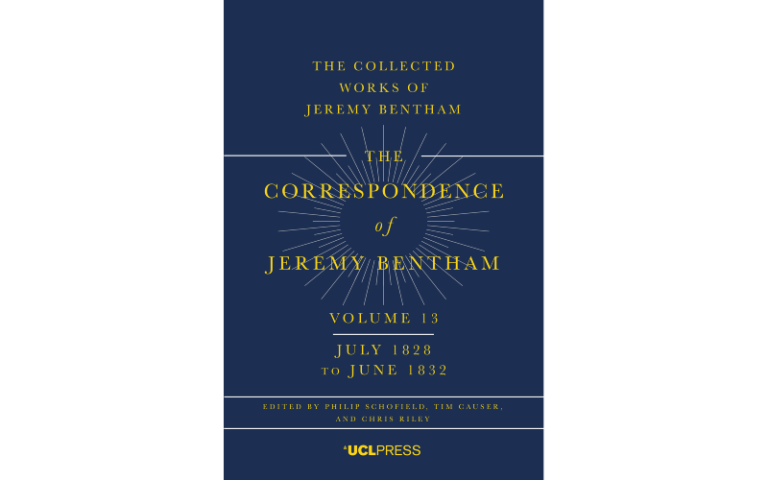The final years and death of Jeremy Bentham uncovered
11 April 2024
The Correspondence of Jeremy Bentham, Volume 13 completes the critical edition of all known and publishable letters sent both to and from philosopher Jeremy Bentham.

The publication today (11 April 2024) of The Correspondence of Jeremy Bentham, Volume 13, edited by UCL’s Bentham Project, is a landmark in historical and philosophical scholarship, completing the critical edition of the correspondence of the philosopher, reformer, and intellectual inspiration for the foundation of UCL.
The Correspondence of Jeremy Bentham, Volume 13, published in open access by UCL Press, is edited by Professor Philip Schofield, Dr Tim Causer, and Dr Chris Riley of the Bentham Project, based in UCL Faculty of Laws. The volume publishes all known correspondence—474 letters in all—to and from Bentham from 1 July 1828 until his death on 6 June 1832. The introduction to the volume outlines the main occurrences in Bentham’s life during this period, while the detailed historical annotation of the letters brings vividly to life Bentham’s domestic, cultural, and intellectual world for the modern reader—including accounts of Bentham’s regular dinner guests, his dry sense of humour, his visits to the theatre, and his continued production of written works and active commitment to the causes of legal and political reform up until the last weeks of his life. The first volume of Bentham’s Correspondence was published in 1968, and now researchers and the public, for the first time, have access to correspondence across Bentham’s lifetime.
By 1828 Bentham was a fêted figure and was at the height of his international fame. His correspondents include Robert Peel, Henry Brougham, the Duke of Wellington, his old friend the Marquis de La Fayette, the Guatemalan politician José del Valle, and Andrew Jackson, the President of the United States of America. A particularly notable feature of Correspondence, Volume 13 is the publication, for the first time, of all known correspondence between Bentham and Daniel O’Connell, the Irish ‘Liberator’. The volume also includes considerable biographical detail about Bentham, and a particularly moving account of his meeting, just weeks prior to his death, on 14 April 1832 with Maria Gisborne, who he had not seen since the early 1790s.
The volume includes Bentham’s Last Will and Testament of 1832, in which he makes arrangements for the disposal of his property, for funding the production of an edition of his work, for a large donation of books to UCL, and for the dissection of his remains and subsequent use of them to create his auto-icon, which came to UCL in 1850.
Bentham spent his final years continuing to actively pursue and promote a variety of projects, including legal and political reform, through various direct and indirect strategies, including the placing of articles in newspapers and periodicals promoting radical causes. His literary output during this period was extraordinary: he continued to work on his massive ‘Constitutional Code’, Official Aptitude Maximized; Expense Minimized (1830) sought to promote the aptitude of official functionaries, and Jeremy Bentham to his Fellow Citizens of France, on Death Punishment (1831) was perhaps his clearest statement on the evils of capital punishment. All of the biographical and intellectual context of the correspondence is expertly illuminated by members of UCL’s Bentham Project.
The Bentham Project was formally established as a central UCL initiative in 1959 in order to produce an authoritative edition of The Collected Works of Jeremy Bentham. To date, the Bentham Project has published 36 volumes in the edition, which when complete will eventually run to over 80 volumes.
The Correspondence of Jeremy Bentham, Volume 13 can be downloaded for free or purchased from the UCL Press website.
 Close
Close

